Personal Stories
From the Battlefield to the Chuppah: Nir Rubin’s Story of War, Loss, and Choosing Life
A combat medic’s powerful journey through trauma, faith, gratitude, and remembrance
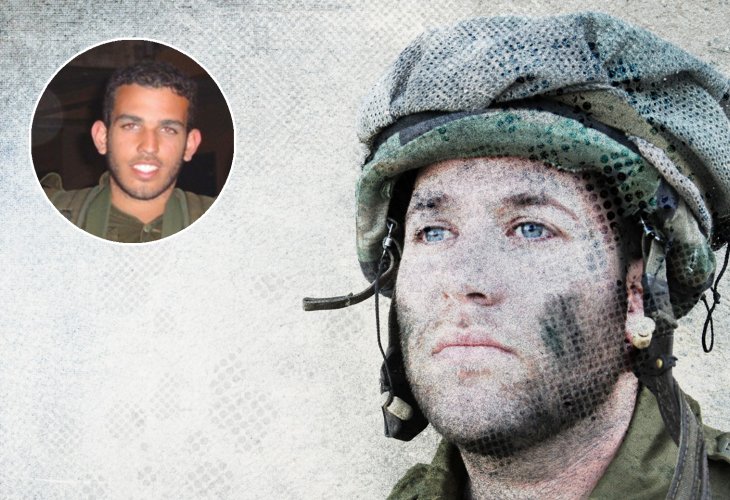 Nir Rubin (in circle: Shimon Dahan, may Hashem avenge his blood)
Nir Rubin (in circle: Shimon Dahan, may Hashem avenge his blood)More than fifteen years have passed since the Second Lebanon War, but if you ask Nir Rubin, who took an active part in some of the war’s toughest battles, he will tell you that for him there are things that remain carved deep into his mind and heart, and do not fade.
“I know I’m not the only one,” he emphasizes. “Tens of thousands of IDF soldiers entered Lebanon. Some didn’t make it out alive. Many others came out physically wounded, emotionally wounded — or both.” His voice drops. “My memories aren’t only from the difficult sights. They’re also from my personal story, because I got married exactly a week after the most fateful battle — where I saw my friends fall, and I was given the task of handling the bodies. One week later I had to walk to the chuppah and dance…”
Looking Death in the Eyes
This conversation with Nir isn’t happening by chance. On Chanukah — when we celebrate victory in war, Nir feels he also has the moving right to mark a victory in his own personal battle: the moment he chose life, decided to keep living, and more than that — to strive for a life filled with meaning and closeness to the Creator.
“In fact, my story begins about two years before the war,” he says. “That’s when I first met Orit, who later became my wife. The one who brought us together was a good friend named Shimon Dahan, and thanks to him we met. Even before we were engaged, Shimon wouldn’t stop checking in on us, and each time I reassured him: ‘You’ll see, it’ll be fine — you’ll be the main matchmaker at our wedding.’”
Not long after, Shimon and Nir were drafted — both to combat units in Golani, beginning their army service. During their service, Nir and Orit finally became engaged and set their wedding date for the summer. Who could have imagined that just two weeks before the wedding, the Second Lebanon War would break out?
The war, as is known, erupted suddenly after an incident in which two IDF soldiers were abducted from the Israel–Lebanon border and three were killed. Israel responded with full force of massive aerial attacks and a ground operation.
One of the most well-known battles of the war took place in Bint Jbeil, where Nir found himself fighting with all his strength less than two weeks before his wedding.
“Before us, Golani’s 51st Battalion entered the area — my friend Shimon served there,” Nir recounts. “They fought about forty Hezbollah terrorists and began their operation at 5:05 a.m. Later, at 10:00 a.m., my team and I joined the battle, among other things to evacuate the wounded. We managed to evacuate all the wounded, but when we came to evacuate the fallen, we were stopped and told: ‘We don’t endanger lives for dead soldiers. Evacuate them at night, when the risk of getting hit is lower.’”
That night, Nir and his friends returned to the battalion to evacuate the bodies. “As a combat medic, I was ordered to go through the bodies and make sure there was no essential equipment in their pockets before we began the stretcher carry,” he explains. “I started the horrifying task, and when I reached the third body, I felt my heart skip… I recognized him — Shimon, my matchmaker, the guest of honor at my wedding — lying there lifeless.” Nir pauses, takes a deep breath, and then says quietly: “The only thing that ran through my mind in that moment was that I had never told him thank you. He gave me so much, and I never truly looked him in the eye and thanked him.”
He says it was a moment that changed his life in every way. “After you see things like that, nothing goes back to how it was. But in my case, there were also insights about everyday life — about gratitude, about understanding that you shouldn’t wait for the future to express feelings. If you want to thank someone or tell them what they mean to you — do it today, before it’s too late. It hit me so hard.”
Dancing and Crying
Nir received leave from the army for his wedding and found himself in a surreal situation — preparing for the biggest day of his life while knowing his friends were still in the Lebanese mud, risking their lives and fighting to the limit.
What does a wedding look like in that state?
“To be honest, it’s hard for me to answer, because I don’t really remember,” he admits. “A few years ago I decided to create a performance about the battle of my life. When I started gathering materials, I tried to do a kind of ‘debrief.’ As part of that, my wife and I watched our wedding video from beginning to end. When it ended, she said: ‘You know, you’re there at the wedding — but you weren’t really there.’ And she was so right. To this day I remember walking around my wedding, constantly thinking about my unit — ‘Are they still fighting, or have they already left Lebanon? And what about my matchmaker, who cared so much about our shidduch, and in the end didn’t get to wish me mazal tov?’”
He adds that later he discovered his friends had actually left Lebanon that very evening and planned to come to the wedding — but while on the way, near the Iron Interchange on Highway 6, they were called back to Lebanon, and none of them arrived.
“You could say I was physically present at the wedding,” he says, “but my thoughts were not there at all.”
Nir notes that life is stronger than anything, and so he found himself continuing forward fairly quickly despite the difficulty and the images that kept flooding him.
“Thank God, we had sweet children, and outwardly everything seemed fine. But the truth is, it wasn’t simple at all. The memories didn’t stop surfacing. The thoughts kept coming. Something in me stayed on the battlefield — with the sights and the sounds, and also with the silence.”
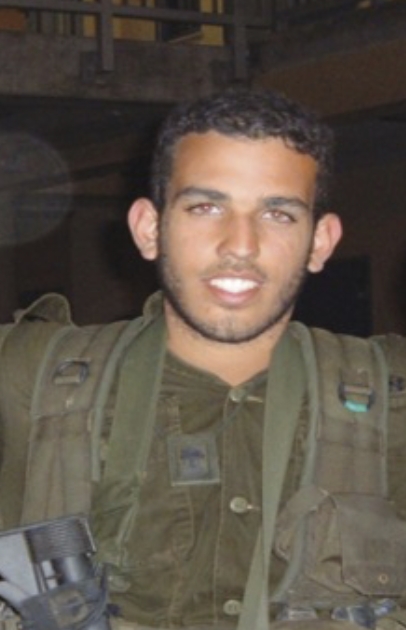 Shimon Dahan, may Hashem avenge his blood
Shimon Dahan, may Hashem avenge his bloodWhat helped you keep going?
“First and foremost, there was a simple understanding: life has to go on for me and for the children,” he says. “And I also want to say that I was never alone in this journey. My friends from the battalion are like family in every sense. They went through everything with me, and we’ve stayed connected until today — supporting each other and carrying it together.
“A few years ago we organized a ‘release journey’ — a full week accompanied by psychologists. Together we analyzed everything that happened to us and reached very deep places we hadn’t even known existed. It was incredible to see how all of us supposedly went on with life, without anyone stopping and saying, ‘Something isn’t okay.’ But when we went deeper, we understood we were all carrying scars.
“And yet our conversations are always mixed with a kind of irony — we know how to laugh at ourselves at exactly the right moment, in the right measure, with respect. That journey was very special. A lot of deep things that had been left open for years found closure there.
“And of course there’s my wife and the kids, who are always with me. They wrap me in such love, and I know clearly that no matter what I go through — if I fall backward, someone will catch me. That feeling is healing.”
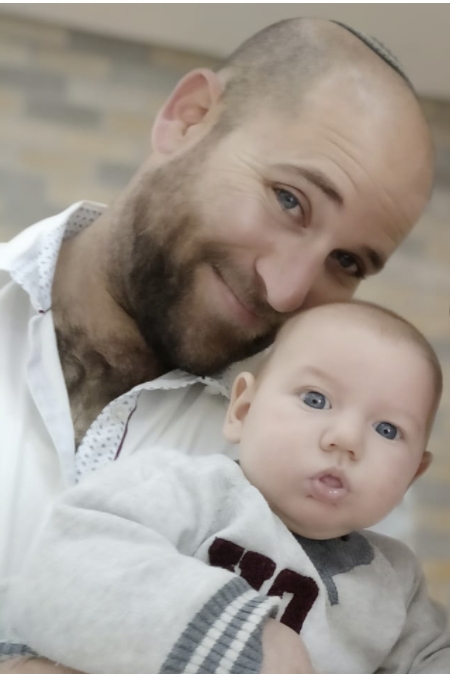
Since that battle, did you ever meet Shimon’s parents?
“I couldn’t attend the funerals because we were still inside Lebanon,” Nir says. “But after I got out, the most natural thing was to go to the shiva. And I did — one day I got on a bus and went to Ashdod, to the Dahan family home. But right as I walked up the stairs, someone — until this day I don’t know who, grabbed me and warned: ‘Don’t go in wearing uniform. It’s too hard for the family to see soldiers in uniform.’”
“I turned around, got back on the bus, and went home.” “For ten years I never set foot in Shimon’s house. His family didn’t even know my story or that I existed. But about five years ago, when I started telling my story publicly through a performance — one of the central messages I wanted to convey was gratitude. And I realized I can’t call on people to do good before I do the most basic thing required of me.”
So he called Meir, Shimon’s brother, introduced himself, and asked to meet the family. “I came to Shimon’s home, sat with Meir and with Shimon’s father, Yaakov. I showed them videos they had never seen, and I asked for their blessing for the performance. At the end, Shimon’s father stood up and hugged me tightly. He said: ‘You came to thank me, but I want to thank you — thank you for remembering and reminding people about Shimon.’ And he asked me: ‘Please pass on my thanks to everyone who hears the story — that they learned about Shimon, and may they take something from him into their own lives.’”
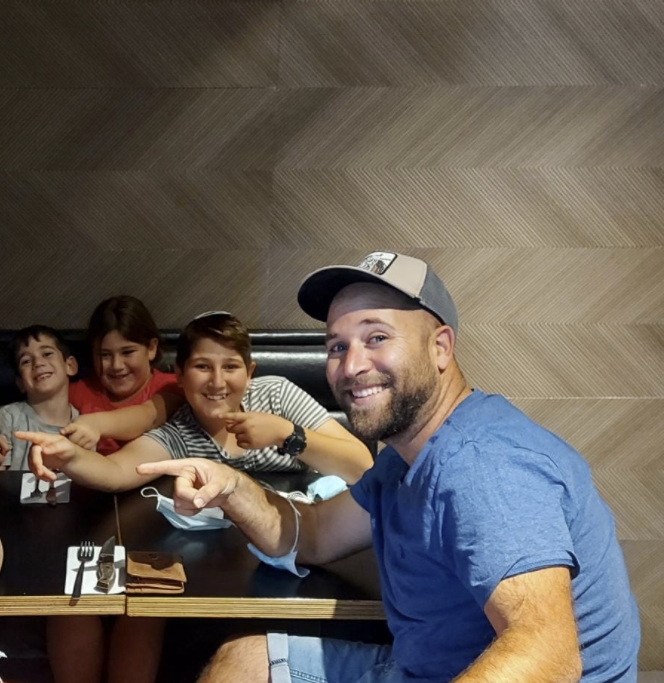 Nir Rubin with his children
Nir Rubin with his children
As a religious man, how did you deal with what you experienced?
“As they say, facts are hard to argue with,” he answers. “And the reality is that in the lowest places of my life, I looked up to the sky and felt God from the closest place possible. There were moments when missiles were fired at us from four kilometers away and we had no ability to respond — only to close our eyes and hope the missile wouldn’t hit.
“In situations like that, you’re closest to the Creator. For me, those were the purest moments of my life — just me and God, with nothing human in between. It was clear to me that whether I wanted it or not, I believe. And God alone would decide whether I’d make it out, and how.
“Over the years those feelings faded. There are periods when I’m higher and periods when I’m lower. But I always know the foundation of my faith was built there — in southern Lebanon, and it’s a stable, strong foundation.”
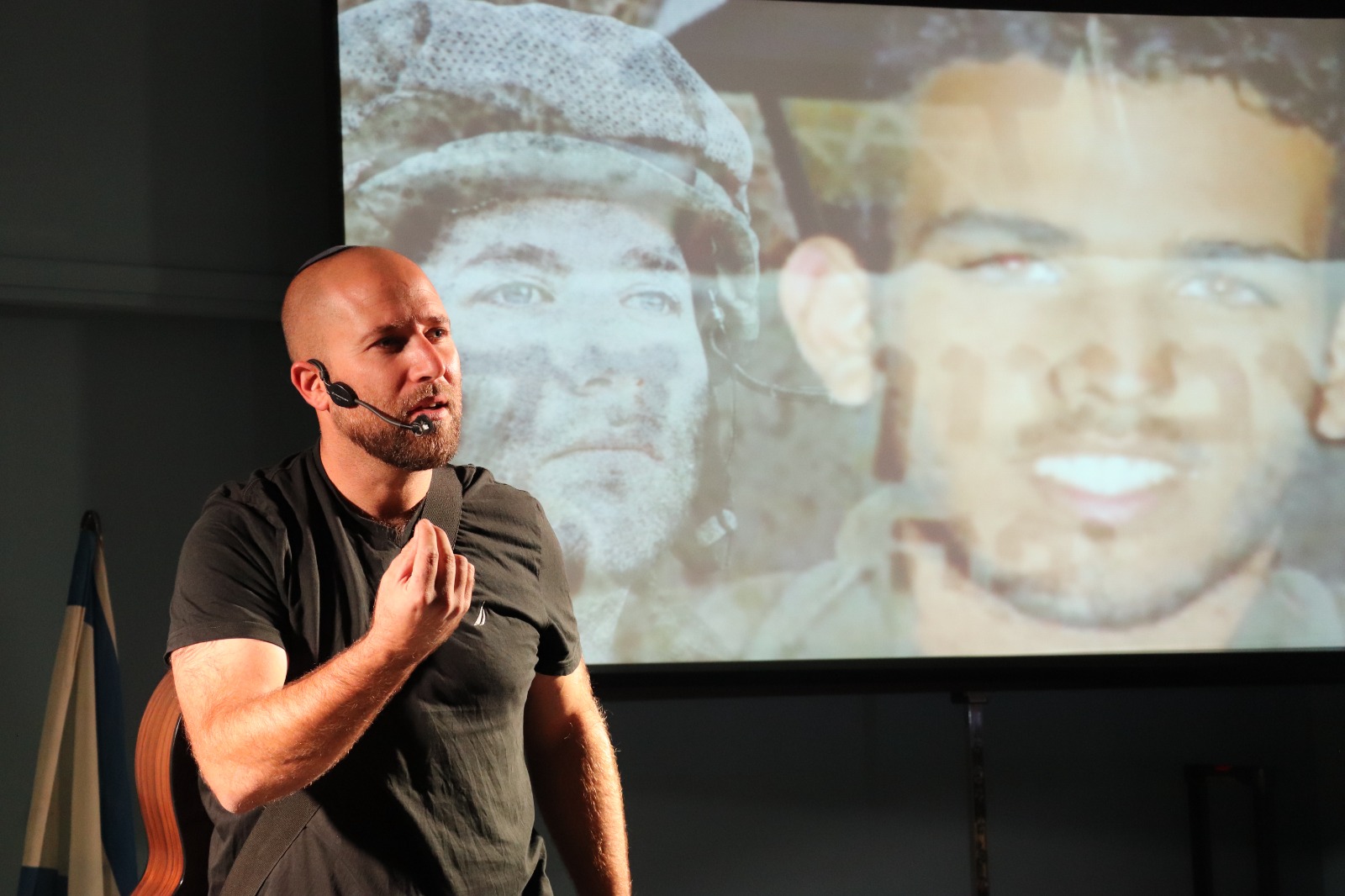 Nir Rubin giving a lecture
Nir Rubin giving a lecture
The War Didn’t Stay Behind — And He Doesn’t Want It To
“Can I say I left the war behind and continued with life? No,” Nir says. “I don’t think something like that can ever be ‘behind’ you. The battle will always be part of me — and honestly, I don’t want it behind me. It’s a significant and important part of my life. I lost dear friends there, and I changed there.”
At times, he says, he still gets pulled back into what happened.
He gives a surprising example: “When my youngest son was born, we named him Peleg Shimon. He’ll carry that name proudly wherever he goes. They say a person’s name influences them and their surroundings, and I bless Peleg that, as the verse says, ‘He will be like a tree planted by streams of water, whose leaf does not wither’ — so too he will stay connected to values, and from them he will be able to flow forward, like a peleg — a small stream fed by the foundations of a larger current.
“And I hope that his second name — Shimon, will reflect in his essence. Because Shimon was truly one big heart with a huge smile. He knew how to see the person in front of him not externally, but with pure inner vision, without judgment. For Shimon it didn’t matter who you were, where you came from, or what you wore — first you deserved a smile, a hug, and love. I pray that Shimon’s values will influence my little Peleg — and all of us.”

